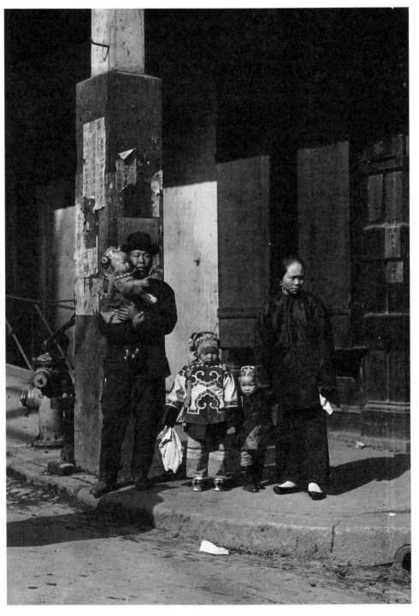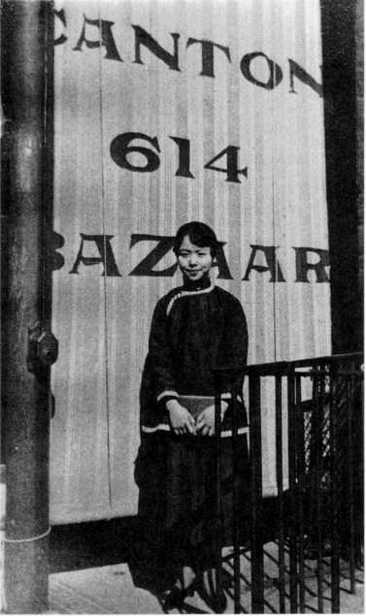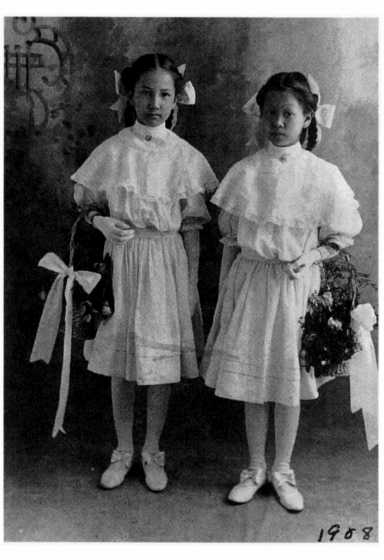Unbound Feet: A Social History of Chinese Women in San Francisco (22 page)
Read Unbound Feet: A Social History of Chinese Women in San Francisco Online
Authors: Judy Yung

To sum up, it may be said that on the road of assimilation, the nativeborn Chinese have gone much farther than the Chinese of early days.
They have been Americanized to such an extent that their relatives in
China may find little in common with them. But the native-born Chinese are not completely assimilated, for they still have race-consciousness.3
Despite the insurmountable barriers, some Chinese Americans continued to push in that direction, while others became resigned to their
second-class status. Most, however, moved toward accommodationmaking the best of the situation until social conditions changed.
In their efforts to take the first steps toward breaking the double
binds of sexism at home and racism on the outside, to define their own
ethnic and gender identity, second-generation women were greatly influenced by Chinese nationalism, Christianity, and acculturation to
American life. As their stories demonstrate, the ideals of women's
emancipation that were embedded in the Chinese nationalist movement
encouraged parents to educate their daughters, allow them to work outside the home, engage in free marriage (as opposed to arranged marriage), and become politically active for the sake of a stronger and more
modern China. Christianity reinforced many of these same values. By
emphasizing female identity, independence, education, and spiritual
equality, Protestant institutions such as the YWCA drew Chinese girls
and women into the public sphere, familiarized them with Western customs and beliefs, and encouraged them to participate more actively in
civic affairs. Public schools and the mass media further instilled in them
the values of individuality, equality, and freedom as well as the desire for
the good life, characterized by fashionable clothes, romantic affairs,
sports, jazz, moving pictures, partying, and the like. However, as second-generation women tried to become Americanized, their newly
adopted lifestyle often clashed with their cultural upbringing at home.
Cultural Upbringing at Home

As children, most Chinatown girls led sheltered lives following Chinese traditions. Their mothers usually taught them to follow
the "three obediences and four virtues" and groomed them to become virtuous wives and mothers. Daughters growing up in the early 19oos
were expected to give unquestioning obedience to their parents and remain close to home, where they helped their mothers with incomegenerating work, shopping, and housework. Nurtured in Chinese culture, they spoke Chinese, ate Chinese food, and celebrated Chinese
holidays. Although sons were still favored over daughters, girls were often more valued in America than in China because of their scarcity and
the increased opportunities available to them. Moreover, Christian doctrine and Chinese nationalist ideology both advocated women's rights
and, together, influenced social attitudes toward the value and upbringing
of girls, especially among middle-class families. A comparative look at
the early years of Alice Sue Fun and Florence Chinn Kwan, both of
whom grew up in San Francisco Chinatown in the i9oos, shows how
these factors affected the cultural upbringing of Chinese American girls.
Given the working-class background of most Chinese families in San
Francisco at this time, Alice's story is the more representative of the two.4
She was only seven years old when she lost her father because of the
19o6 earthquake and fire. Forced to evacuate their home in Chinatown,
the family moved across the bay to Oakland, where they lived in a
makeshift tent. "My father dug clams and got sick eating them," Alice
recalled. "Contaminated water, you know. So he died soon after of typhoid fever. That was in September. My sister was born four days after
my father died." Alice's mother decided to move her six children back
to San Francisco Chinatown. A year later, she remarried.
While her stepfather worked as a cook, her mother supplemented the
family income by sewing at home. When she was eight, Alice began attending the Oriental Public School from 9:oo to 2.:3o and True Sunshine Chinese School from 2-:3o to 5:oo. Then she would come home
and help with the housework and take care of her younger brothers and
sisters. "I was the one who sewed their clothes, using those old foottreadle machines. Everything was used. I would take an old shirt apart
and repiece it together for Little Brother's trousers." Because her mother
followed tradition and rarely left the house, it also fell on Alice to do
the shopping. Both of her parents were very strict. When she misbehaved, her mother would punish her with a linggok (a knuckle-rap on
the head) or, worse, with a switch, hitting her "until flower patterns [black
and blue marks] broke out." Alice particularly resented the lack of freedom of movement:
It wasn't easy. Mother watched us like a hawk. We couldn't move without telling her. When we were growing up, we were never allowed to go
out unless accompanied by an older brother, sister, or somebody else....

Alice Sue Fun (center) with (from left to right) Uncle holding Harris, Elsie,
and Mother during Chinese New Year, 1904. (Arnold Gcnthe photo;
courtesy of Library of Congress)
If you wanted to go shopping, you might as well forget it because, one
thing, you didn't have any money. Secondly, you knew your mother
wouldn't let you go, so what's the use of asking, right?
There was little time for play, but Alice had fond memories of Chinese celebrations, the Chinese opera, embroidery classes at the Congregational church on Saturdays, and the 19 15 Panama-Pacific International Exposition. Although Alice attended church on Sundays, her
mother preferred to worship her Chinese gods at home. She also brewed
Chinese herbs whenever anyone became sick, cooked all the special dishes
during the Chinese holidays, related legendary stories associated with
the holidays as well as scary ghost stories, and took the children with her
whenever she went to the Chinese opera.
In the old days, there were two operas a day. It cost a little over a dollar
for the grand admission ticket, but after nine o'clock the admission would
be lowered to twenty-five cents. Free for children if accompanied by an
adult. Everyone ate and talked during the opera. It was quite festive.
That's how I learned to love the opera.
In this way, Alice grew to appreciate her Chinese cultural heritage. The
highlight of her childhood was the 19 15 International Exposition held
in San Francisco to celebrate the opening of the Panama Canal and the
rebirth of the city following the earthquake. "It was once in a lifetime
and we saved to go see the fair. For about twenty cents a day you could
spend the whole day there. There were so many things to see, but I was
always partial to the Chinese exhibits," she said.
When Alice turned fifteen, her mother decided that was enough education for a girl and that Alice should help the family out.' Alice found
a sales job at the Canton Bazaar and gave half her earnings-$25 a month
in gold pieces-to her mother. Experiencing a degree of freedom and
economic independence, she decided to strike out on her own. Against
her mother's wishes, she married her Chinese teacher, whom she described as "poorer than a church mouse," and moved to New York. When
her marriage failed, she left her husband and traveled around the world
as maid and companion to the actress Lola Fisher. "She treated me very
well," said Alice. "Working those few years with Miss Fisher educated
me, broadened my outlook, and made a different person out of me." As
she had deeply resented her sheltered and strict upbringing, she especially appreciated the opportunity the job gave her to travel, to go beyond her mother's limited world. Years later, she compared her life with
that of her mother in this way:
Alice Sue Fun at the Canton
Bazaar, where she worked as a
salesgirl in 19 15. (Courtesy
of Alice Sue Fun)

My mother lived a very sheltered life. Even up to her old age, she never
trusted herself to go out alone. She was afraid that she'll get lost. And
then she didn't like to exercise a lot, or walk a lot.... I would go out
anytime I want and anywhere I want. Even in foreign countries, I
wasn't afraid to go out alone. In Hong Kong, I went exploring all over
on the bus.... I like to be independent. I don't like to always be accompanied by people. I guess I had enough of that when I was a young
girl.
Whereas Alice was raised according to Chinese tradition, Florence
Chinn Kwan faced fewer restrictions growing up in San Francisco Chinatown because of the liberal middle-class background of her parents.
Her father was a missionary teacher who had come to the United States
when he was twelve years old. He later returned to China to marry and
was able to bring his wife back to America. Both parents were highly nationalistic toward their homeland and modern in their chosen lifestyle.
After the 1911 Revolution, her father was among the first to cut his
queue; her mother, to unbind her feet; and both, to allow their daughter to appear as a princess in the parade that celebrated the founding of
the new republic. Whereas Alice always dressed in Chinese-style clothes,
Florence wore Western dresses. "My father didn't want me to wear Chinese clothes. He said he didn't want people staring at me and saying
you're Chinese, you're not American," she explained.6 Although she,
too, was not allowed to go out alone, her parents were not as strict as
Alice's. Her father took her along on his daily walks to the park, and often downtown or to Chinatown to shop. Also unlike Alice, she was rarely
physically punished. The only time it happened was when she slid down
a bannister and broke her front teeth.

Pauline Fong Woo (left) and
Florence Chinn Kwan (right) as
flower girls in 19o8. (Courtesy
of Florence Chinn Kwan)
While Alice described her parents as uneducated, hard-working,
strict, and distant to their children, Florence remembered her father as
gentle, honest, and devout. "He would hold me on his lap while reading in his study. He was quite artistic and used to draw pictures for me
when I was a child." Her mother was patient, alert, and humble, with a great capacity for learning. Like Alice's mother, she sewed at home to
supplement her husband's income. But as Florence recalled, she was also
quite active outside the home. Aside from starting the Women's Missionary Society at the Chinese Congregational church, "she was always
helping the sick and the needy by going to their homes, cooking for them
and caring for them all without compensation."7
